If Someone Doesnt Match After Med School

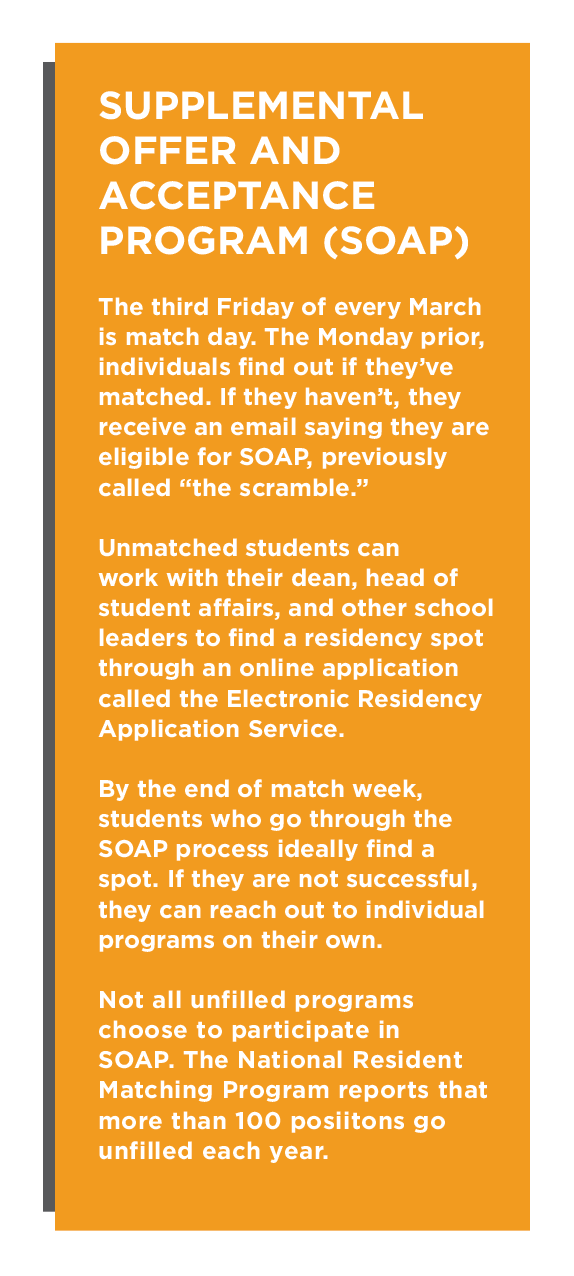 According to the National Resident Matching Program, 96.ii pct of medical school graduates were matched with a residency program in 2018, the most successful year on record. But even that high friction match rate left 1,171 individuals seeking an alternate fashion to advance their careers.
According to the National Resident Matching Program, 96.ii pct of medical school graduates were matched with a residency program in 2018, the most successful year on record. But even that high friction match rate left 1,171 individuals seeking an alternate fashion to advance their careers.
Verbal numbers on how many of these individuals come up from underrepresented backgrounds are not known, co-ordinate to leaders at both the National Medical Association (NMA) and the Student National Medical Association (SNMA).
But the issues created by non matching impact both the students and the healthcare field. Those who do non secure a residency are saddled with significant student debt to repay without a guaranteed income, even every bit the shortage of physicians nationwide continues to increase.
Reasons for Not Matching
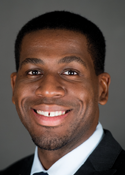
At that place are both systemic and individual reasons for why a new Doctor of Medicine (Dr.) may not land a residency. Some don't score high enough on the tests required for access, while others utilise for specialties that are highly competitive, such every bit dermatology, according to Gabriel Felix, MD, president of the Student National Medical SNMA.
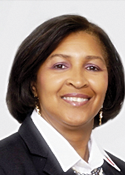
Others may not effectively develop relationships with hospitals or clinics, causing them to autumn through the cracks, co-ordinate to Doris Browne, MD, president of the NMA. In add-on, some underrepresented individuals may seek piece of work in large cities where the demographics are more than closely aligned with their racial and indigenous background, Browne says. These urban communities tend to exist more competitive, meaning there are fewer slots.
 Both medical education and the healthcare system play a office in the trouble. Md programs continue to expand, just residency programs are not growing at the same charge per unit. In addition, programs are becoming more selective in the candidates who receive offers. Following the 2018 match procedure, there were 1,268 positions left unfilled.
Both medical education and the healthcare system play a office in the trouble. Md programs continue to expand, just residency programs are not growing at the same charge per unit. In addition, programs are becoming more selective in the candidates who receive offers. Following the 2018 match procedure, there were 1,268 positions left unfilled.
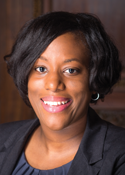
Marshala Lee, MD, MPH, who is addressing this issue as part of her work with the Health Resources and Services Administration (HRSA), says residency programs don't want to run a risk on candidates who don't have the strongest records. "They would prefer spots go unfilled than to select someone who might take more challenges in finishing a residency," she says. Additionally, some students don't receive the mentorship they demand to help them secure competitive spots.
The Professional Toll
Not matching takes a heavy professional cost on new MDs and also presents bug for the healthcare field. When residency spots become unfilled, it delays opportunities for graduates to practice and hinders the medical field's ability to combat the projected physician shortage. The Association of American Medical Colleges (AAMC) reports that the United States is likely to demand an additional 42,600 to 121,300 doctors by 2030.
Rural areas — non a first choice for many medical schoolhouse graduates — will exist particularly afflicted past this issue. The AAMC projects an fifty-fifty more meaning shortage of chief care physicians. Information indicates a shortfall of fourteen,800 to 49,300 of these doctors by 2030.
Much of the shortage tin already be seen in rural areas and communities where underrepresented groups alive, making a successful match all the more of import. Doctors from those communities tend to render to them to practice master intendance after graduating, Lee says.
"Underrepresented physicians, despite the low financial incentives of going into primary care, are still very impassioned [about this practice]," Lee says. "Nosotros can run into in the data that they are still going into primary care in higher numbers, despite having a college debt burden than others."
The Personal Toll
Students who do not land a residency ofttimes bear their medical schoolhouse and undergraduate debt for a year or more as they wait to re-enter the match. According to Browne, it can range from $200,000 to $500,000.
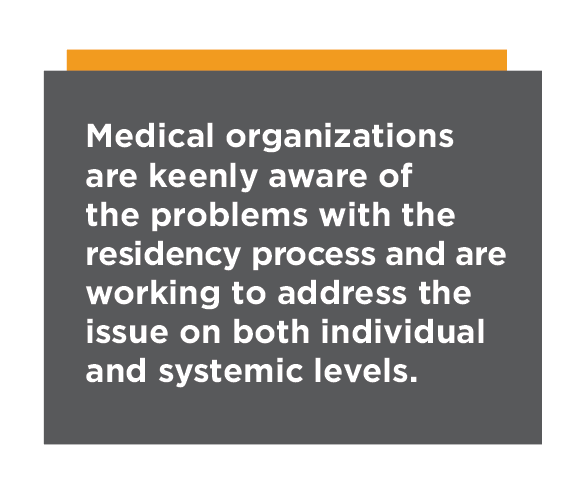 Those students do take options, including working as medico assistants, nurse practitioners, or midwives; serving as administration in a doc'due south office; or getting involved with government research. Notwithstanding, information technology becomes increasingly hard to land a residency in their preferred specialty if they don't lucifer the outset time around.
Those students do take options, including working as medico assistants, nurse practitioners, or midwives; serving as administration in a doc'due south office; or getting involved with government research. Notwithstanding, information technology becomes increasingly hard to land a residency in their preferred specialty if they don't lucifer the outset time around.
"I've known [unmatched] medical students who go to nursing schools," Lee says. "I have a friend who is a paramedic right at present. She hasn't matched for three years. The further out you become, the less likely her chances of ever matching go. She started working every bit a paramedic to make ends meet."
Does Bias Play A Role?
Some individuals from underrepresented groups feel they face bias in the interviewing process for a residency.
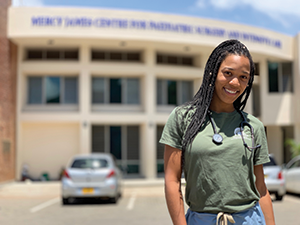
Chantelle Washington, DO, is a graduate of Michigan Land University (MSU) Higher of Osteopathic Medicine who recently matched in emergency medicine at Henry Ford Hospital in Detroit. A Detroit native and a adult female of color, she is passionate almost giving back to her community. When she was interviewing at residency programs across the Midwest, she explicitly asked what doctors are doing to address issues of multifariousness in their programs.
To this question the interviewer responded, "I laugh at questions like that. I don't see color. I'm non going to rank someone higher than some other person if they have lower scores and they just don't see the mark," Washington recalls.
She argues there is an chemical element of cognitive dissonance in the fact that most medical schools work hard to recruit diverse applicants, but at least some residency programs don't seem to prioritize this.
Washington also expresses frustration with how some of her fellow MDs speak most her hometown of Detroit. Many of them say they are attracted to the Detroit area because "it's proficient pathology," she says, which refers to the types of medical problems they will be exposed to in emergency rooms and outpatient clinics. "They're excited to learn about the cases but seem to forget that these are people we are treating," she explains.
Another group negatively affected past the residency process are some young immigrants protected under the Deferred Activeness for Childhood Arrivals programme, Browne says. They sometimes choose to not apply to residencies because doing so could result in their being deported dorsum to their country of origin.
What Institutions Are Doing to Aid
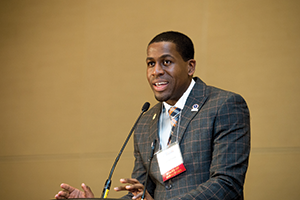
Medical organizations are keenly aware of the problems with the residency process and are working to accost the event on both individual and systemic levels. These efforts include the following:
●HRSA'due south Pedagogy Health Middle Graduate Medical Instruction Plan provides residency slots to new MDs in community wellness centers versus large hospitals. This arrangement allows doctors-in-grooming to gain experience with community-based healthcare, where patients tend to exist uninsured, low-income, or both. The feel can motivate these individuals to practice in underserved areas in one case they complete their residency.
●Iii U.South. senators introduced a bipartisan nib on Feb. half dozen to aggrandize the number of federally supported residency positions. It proposes calculation an additional three,000 Medicare-supported positions each year for 5 years.
●NMA offers mentoring programs to medical students preparing for residency. Additionally, several members of NMA concord offices in diversity and inclusion committees at U.S. universities, using their expertise to assistance underrepresented students navigate the medical school awarding process.
●SNMA hosts an annual conference in which they conduct data sessions for individuals who did not match to help them motion forward.
Ginger O'Donnell is a senior staff writer for INSIGHT Into Diversity.This article ran in our May 2019 consequence.

Source: https://www.insightintodiversity.com/healthcare-suffers-when-medical-school-graduates-dont-match/
0 Response to "If Someone Doesnt Match After Med School"
Post a Comment